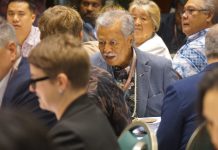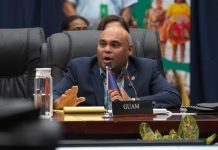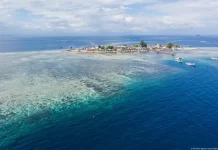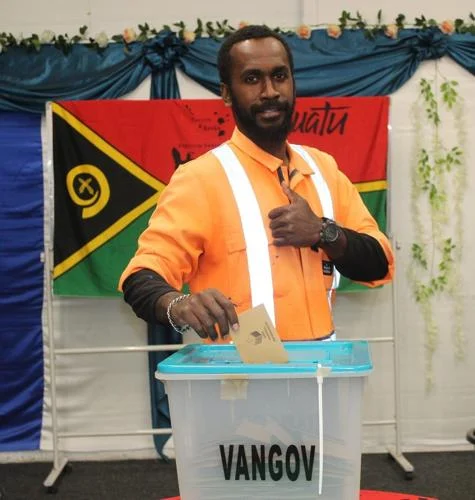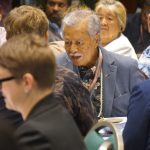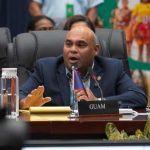Vanuatu Minister of Internal Affairs, Johnny Koanapo, said the government should make future referendums compulsory to ensure inclusive participation.
While the referendum provided an opportunity for citizens to exercise their rights under Article 7 of the Constitution to make changes, there were some who were irresponsible in abstaining from voting, he stressed.
He said while turnout in some polling stations were satisfactory, there is need for educational efforts to ensure citizens understand their fundamental duties.
The minister said the turnout in Australia where up to at least 5,000 to 9,000 voters were expected, just over one thousand people showed up for voting.
He said individuals on government-run programmes there should seriously consider the call from the government and parliament to exercise their rights, given that they are enjoying government services.
“As a matter of policy, the government must ensure that future referendums are compulsory. I am not talking about national elections, but referendum. As minister responsible, I think it’s important we make it compulsory so that everyone must vote,” he said.
“During disasters, everyone line up for food relief, even those who have not voted. We should not foster a society where some work while others only sleep and eat. Instead, we should promote a society where everyone contributes, fulfilling their fundamental duties as stated in Article 7. This nation requires the involvement of all its citizens, not just a few.”
The minister said there is still need for detailed analysis of the turnout in the different voting stations, nevertheless the overall referendum turnout was successful.
Koanapo on behalf of the government has acknowledged the participation of all citizens for exercising their constitutional right in the country’s first referendum.
He said the successful outcome of the referendum reflects the people’s aspiration for stable government and responsible leadership both now and in the future.
The outcome will shape Vanuatu’s future political landscape, he said.
“The people of Vanuatu have spoken and made their decision on their Constitution. It may not be an outcome that some may expect but the referendum has been a democratic process where everyone was given the opportunity to make their decision,” said the minister.
“The process of amending the Constitution commenced many years ago and late last year, parliament, representing the people of Vanuatu, made the anonymous decision to approve the amendment to the Constitution.
“Many awareness and campaigns, including debates, were staged and both mainstream and social media played an important role in disseminating the information on the amendments and referendum voting processes.
“I want to acknowledge all citizens of their contributions to enriching the debates and campaigns regarding the amendments.”
The minister also thanked the government and parliament for appropriating the VT350 million(US$2.92 million) budget for the referendum and the Ministry of Internal Affairs (MoIA) for ensuring the referendum logistics and arrangements are undertaken, both in-country and overseas.
Koanapo said now that people have voted ‘Yes’ to the change in the Constitution, the implementation of their decision will need to be actioned immediately.
“The process will involve: (1) gazettal of the referendum results which has already been undertaken; (2) the insertion of 17A and 17B into the constitution; (3) official gazette of the Electoral Act and the Political Parties Registration Act; and (4) implementation of the new legislations and Constitution,” he said.
“The Implementation of the Political Parties Registration Act requires registration of parties and the MoIA through the Vanuatu Electoral Office, has a key role in ensuring that parties are properly registered and in accordance with the Political Parties Registration Act.
“There is a lot more tasks to be undertaken to ensure people’s expectations are achieved.
“Political Parties that have in place their constitutions will need to revise their constitution to be in line with the requirements of Political Parties Registration Act. Those Political Parties that do not have constitutions in place will need to develop and adopt their constitutions and register their political parties with the Principal Electoral Officer and in the form approved by the Electoral Commission. Electoral Commission will develop the required application forms which will need (1) name and logo of the political party; and (2) policy platform of the party; (3) copy of the party constitution; and (4) names of the office bearers of the party.
“The constitution of the party is an important document which among other requirements, must provide for the procedures for disciplining members of the political party and termination of their membership from the political party, including procedures for disciplining members of the political party. It is also important that there are provisions for grounds on which independent members of parliament affiliating to a party are deemed to have ceased to affiliate with the political party.”
The minister responsible for referendum said the Electoral Commission will be providing more details to guide political parties in their registration.


